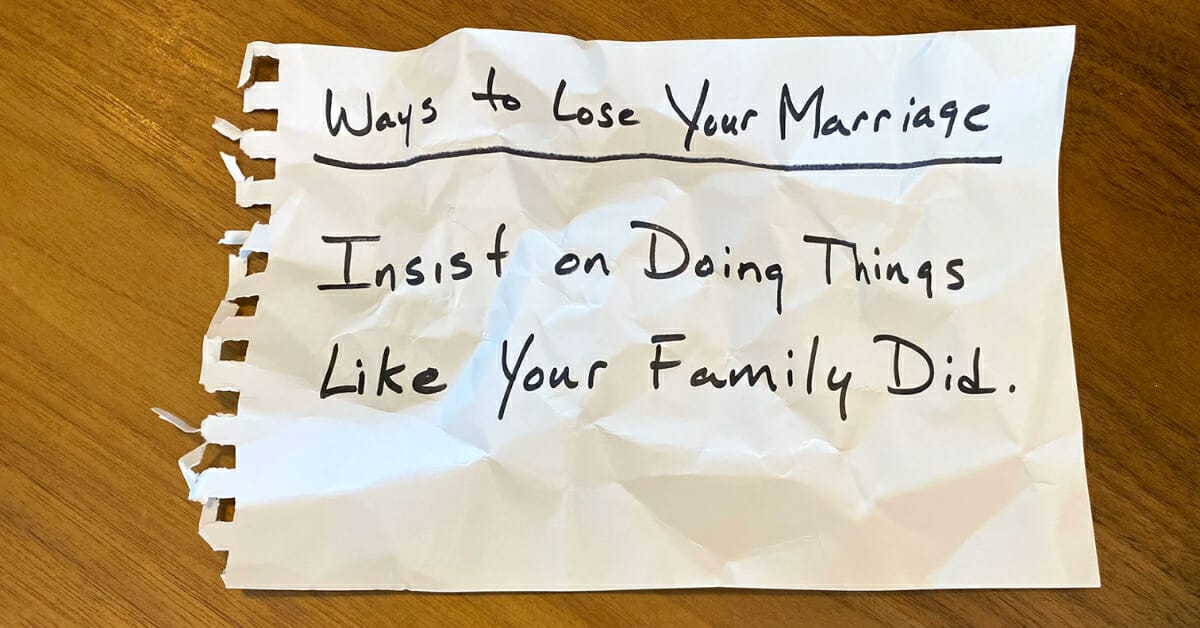My wife and I had only been married for six months, and it was Christmas eve. We had finished dinner, and I was preparing to watch some Christmas specials when it happened. She asked me a question that jarred me. It came out of nowhere. I hadn’t expected it. I couldn’t even believe she was asking it. But there, on Christmas eve, she had the nerve to ask me…”So, you want to open presents now?”
“What do you mean, ‘you want to open presents now?!’ It’s Christmas eve! You don’t open presents on Christmas eve! You open them on Christmas morning! That’s the way I’ve always done it!” It was quite the scene. But to be fair, she was just as incredulous when I suggested she cook a full breakfast of ham, eggs, bacon, sausage, biscuits, gravy, etc. on Christmas morning…because that’s the way my mom always did it.
Suddenly I realized that we grew up in families that did things very differently.
You don’t have to be married long to realize this. Perhaps…
- Your mom cooked every evening, but your wife wants to go out and eat.
- Your dad was handy at fixing anything, but your husband can’t do anything but call a repairman.
- Your family went on nice family vacations, but your spouse’s family never went anywhere.
- You were raised to pick up after yourself, but your spouse wasn’t.
You probably have other examples you could share, but when it comes to marriage, these are the types of things that dampen the relational magic and make things seem more like work.
WHY IS IT BAD TO INSIST ON DOING THINGS LIKE YOUR FAMILY?
Whether it’s holiday traditions or everyday ways of doing things, both you and your spouse come into marriage with different memories and experiences. Some of those memories and experiences you want to hold onto and recreate, while others of those you would rather change. But I can tell you that insisting that your spouse do things like your family did will hurt your marriage.
Maybe you’re just trying to recreate special moments from your childhood so your family can experience them too. There’s nothing wrong with that desire, but insisting on doing things as your family did is not good for the following reasons…
It’s disrespectful and belittling to your spouse and their family.
You come across sounding like the way your family did things was right and the way your spouse’s family did things was wrong. This is hurtful to your spouse and won’t win you any points.
You come across as dictatorial.
Insisting on getting your way is never endearing to your spouse. And it’s especially hurtful when you’re dictating against some of their traditions or ways of doing things. This will leave your spouse with only two options: (1) They can roll over and be subservient, but this is going to create hurt and bitterness on their part. Or, (2) they can become rebellious and refuse to do things the way you want. This will create anger and resentment on your part.
It keeps the two of you from forming new ways that are uniquely yours.
Many wedding ceremonies involve the lighting of a unity candle. The bride and groom each take a candle symbolizing their family, and together they use those two candles to light a candle that symbolizes the start of a new family. Scripture calls it, “the two becoming one.” This involves more than just consummating the marriage. It involves the two of you melting and merging your ways and approaches into something new and unique to the two of you. Insisting on doing things the way your family did is the opposite of that.
SO WHAT CAN YOU DO?
It’s easy to say that the two of you should stop insisting on doing things as your families did, and instead find new ways to do things. But just how can you do that without becoming a doormat or a bulldozer?
Well, it will probably be a little different for each couple, but here are some general principles you can follow:
- Don’t make fun of the way your spouse’s family did things. Even if your spouse makes fun of something they did, refrain from doing that yourself. Just think about how it stings when they do that to you.
- Ask yourself if you want things a certain way because you think it’s best, or just because it preserves a special memory for you. So often, we want to do things the way our family did because we’re trying to preserve a memory or share it with our spouse or family. But often, those memories were for that time and that family, and now’s the time to make new memories with this family.
- Each of you identify the things that are not so special to you and you’d be willing to change. Just because you have some special memories about something in your family doesn’t mean that everything was critical to that memory. Both of you figure out what you could do without and offer that up to your spouse.
- Take what’s left (the things you want to keep) and see if you might be able to fit those together somehow. Maybe there’s a way for the two of you to take the things that are really special to you and join them together into something that fits both of you.
Let’s go back to my Christmas example. After applying the above steps, some possible solutions might be:
- You each open one present on Christmas eve and then the rest on Christmas morning.
- One year you open presents on Christmas eve and the other year you open presents on Christmas morning.
- You have something different than you usually do for Christmas breakfast, but not as elaborate as a four-course meal.
- You have an elaborate Christmas breakfast, but a lite and easy Christmas lunch.
The options are many, depending on whether you have kids, how close you live to family, etc. The thing is to not get stuck in insisting the old way, but instead, move on to creating new ways.
A FINAL WORD…
I know that all of this can sound rather trivial. Who’s going to lose their marriage over whether they open presents on Christmas eve or Christmas morning? But it’s not just about holiday traditions. It’s about how you decide to do life. It’s about a failure to create your own marriage because one or both of you keep trying to live by old family patterns.
Continuing to insist that you and your spouse do things like your family did them will hurt your marriage. And in the long run, it can cause you to lose your marriage. And so…It’s on the list!













